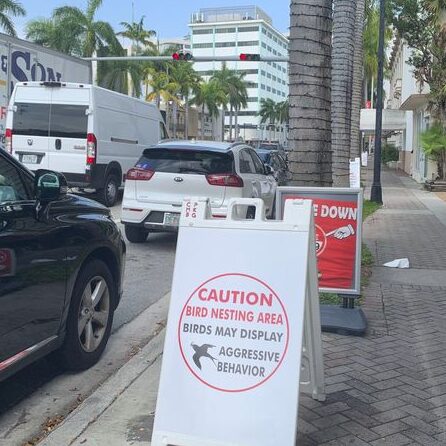In broad daylight, along the restaurants and stores on Miami Beach’s 41st Street strip, pedestrians, bicyclists and even scooter drivers have come under attack.
The culprits: aggressive birds.
Boat-tailed grackles nesting in the palm trees above the sidewalk on Arthur Godfrey Road have in recent weeks been diving at the heads of passersby, including a woman pushing a baby carriage. Large signs between Royal Palm and Sheridan Avenues — where most of the recent attacks have been reported — warn of the birds’ “aggressive behavior.”
The grackles are a federally protected migratory bird species, and the city is legally prohibited from moving or destroying their active nests. So, to ward off the territorial birds, City Hall has enlisted the services of a falcon handler and hung up string with silver tinsel to keep the birds up in their palm trees and away from their targets below, some of whom have resorted to covering their heads with a plastic bag or storage bins.
“Nobody wants to hurt the birds. Nobody wants to hurt their babies,” said Brenda Klein, a Mid Beach resident who said she was attacked about two weeks ago. “But on the other hand, we don’t want to get hurt.”
The city is spending $135 an hour to contract a master falconer, who along with a 3-year-old hybrid falcon named Chop has patrolled the area 8 hours a week since April 9, city spokeswoman Melissa Berthier said.
“While we cannot control the current aggressive behavior of the birds on the 41 Street corridor, we take this matter and the safety of our residents and visitors seriously,” she wrote in an email. “We have contracted an industry professional to assist in establishing a preying bird presence.”
The city plans to keep the falconer on site until the end of the month, when the baby birds are expected to leave the nest.
Falconer Frederick Ottoway, president of the bird-abatement company WingOver Inc, said in an interview that the black birds have swiped at pedestrians because they are territorial and defending their nests. The presence of the falcon will help convince them to stay in the trees where it’s safe, he said.
“They’re protecting their babies just like any other being would,” he said.
The birds may also be foraging for nest materials. On April 10, Ottoway saw a grackle swoop down to pluck hair from a person’s head, he wrote in a progress report filed to the city. The next day, he hung bits of wig hair on a tree and lamppost to offer to the birds.
By this past Saturday, Ottoway wrote, the baby birds had hatched. He wrote they should leave the nest by next Tuesday.
He noted that somebody is feeding the local birds behind a nearby sandwich shop, and recommended speaking with the business owner. He also recommended trimming the palm trees in front of The Forge restaurant to prevent future nesting.
“The City of Miami Beach is showing due diligence with the safety of its residents and has shown compassion towards its wildlife but at times we must let nature take its course in these matters,” he wrote.
There have been reports of aggressive nesting birds in prior years, but Berthier said this is the first time in recent memory the city has hired a falconer. Last year, the Sunset Harbour Neighborhood Association hired a falconer to deal with “nuisance birds,” she said.
After she was attacked by the birds, Klein, the Mid Beach resident, said she has repeatedly complained to the city and has since filmed several attacks on others using her phone.
Klein, 51, said the use of the falcon was only a short-term fix, and that the city should look into keeping birds from making their nests in the palm trees.
“It works for the time that they’re here,” she said of the falcon solution. “Ten minutes after he’s gone — because I was here watching — they’re attacking again.”
Klein said a bird attack may be just a nuisance to some. But to an elderly person or someone riding their bicycle in traffic, she said, it can prove more dangerous.
Lourdes Ravelo, a 38-year-old Mid Beach resident, said the black birds themselves aren’t dangerous but it can be “unnerving” to be attacked — and they can potentially cause a traffic crash. She said she felt comfortable with how the city was handling the disturbance. The thought of having a falcon around to keep her safe made her feel kind of unique, she said.
When Ravelo saw Ottoway patrolling the area on Saturday, she said she snapped a photo. It was her first time seeing a falcon in person, and she said she was excited.
“I think the falcon guy is awesome,” she said. “I think he’s great.”


 DOG RESCUED AFTER SLIPPING INTO BISCAYNE BAY F
DOG RESCUED AFTER SLIPPING INTO BISCAYNE BAY F
 KIM KARDASHIAN, PETE DAVIDSON BREAK UP AFTER
KIM KARDASHIAN, PETE DAVIDSON BREAK UP AFTER 
 Lowest gas prices in Miami, August 6th. #Bugl
Lowest gas prices in Miami, August 6th. #Bugl
 CONTRERAS HITS 2-RUN HR IN 8TH AS CUBS BEAT MAR
CONTRERAS HITS 2-RUN HR IN 8TH AS CUBS BEAT MAR
 TOWN OF SURFSIDE SETS UP LANDMARK TO HONOR THE
TOWN OF SURFSIDE SETS UP LANDMARK TO HONOR THE
 INSTAGRAM IS EXPANDING NFT SUPPORT TO 100 COUN
INSTAGRAM IS EXPANDING NFT SUPPORT TO 100 COUN